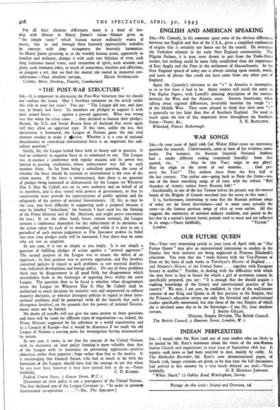ENGLISH AND AMERICAN SPEAKING
SIR,—Mr. Connely, in his comment upon some of the obvious differences between our English and that of the U.S.A., gives a simplified explanation of origins that is certainly not borne out by the record. He overstates the Yorkshire element in the early New England communities. The Pilgrim Fathers, it is true, were drawn in part from the Yorks-Notts border, but nothing could be more fully established than the importance of East Anglia and the Fens in the settlement of Massachusetts. In the New England speech of today one is always coming upon sounds, words, and turns of phrase that could not have come from any other part of England.
Again Mr. Connely's reference to the "r " in America is incomplete, as in so few lines it had to be. Many readers will recall the notes to The Biglow Papers, with Lowell's amusing description of the contrast between the West and the Atlantic coast. Eastern Americans, when talking about regional differences, invariably mention the rough "r" of the Middle West. They seem pleased to think that their own "r" is generally no less faint than that of Southern England. No need to touch upon the fate of this important letter throughout the Southern






















 Previous page
Previous page